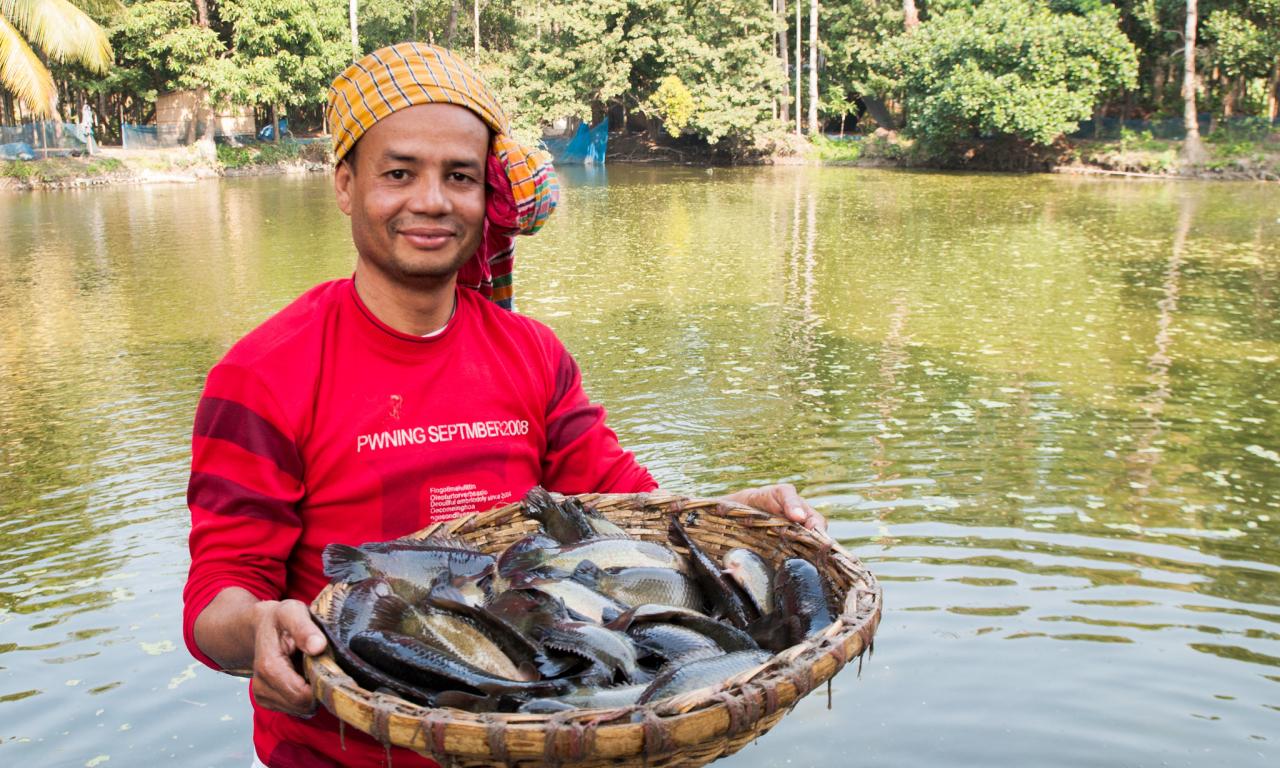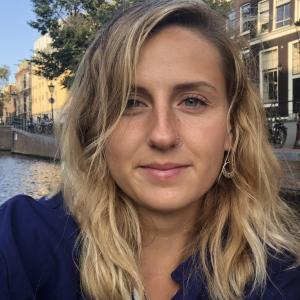
New digital communication strategies are forging international partnerships and boosting collaboration between WorldFish and the Bill & Melinda Gates Foundation in service of smallholder aquaculture farmers.
In the era of COVID-19, new digital communication strategies are helping aquaculture stakeholders to engage one another and fostering international partnerships.
A series of virtual “Learning Lunches,” conducted by WorldFish and the Bill & Melinda Gates Foundation, convened researchers, practitioners and private-sector partners from Bangladesh and Nigeria to facilitate the exchange of information and discuss strategies for developing the smallholder aquaculture sector of each nation, as part of the Aquaculture: increasing income, diversifying diets, and empowering women in Bangladesh and Nigeria project.
While Bangladesh is the world’s fifth largest aquaculture producer, Nigeria’s aquaculture sector is at an earlier stage of development. It was hoped that lessons learned in Bangladesh, such as the importance of nutrition-sensitive approaches to aquaculture, could be applied in Nigeria despite vastly different cultural contexts and government regulations.
The virtual dialogues, conducted over MS Teams, engaged diverse partners from the two geographies to discuss their current progress on project activities and respective challenges to project implementation.
Each webinar centered around a topic related to the development of smallholder aquaculture and its opportunities and constraints: aquaculture finance, digital technologies, gender equality, human nutrition and productivity and markets.
By gathering representatives from different organizations, the lunches eased the dissemination of information between WorldFish, the Bill & Melinda Gates Foundation, development organizations like USAID and public and private sector partners to forge stronger working relationships. The meetings provided an opportunity for cross-learning and multidisciplinary action with diverse practitioners participating, including gender experts, nutritionists, aquaculture production specialists and financial service providers.
“The ability to bring more project partners into strategic discussions ushers in a new era for development,” said Belinda Richardson of the Bill & Melinda Gates Foundation. “Due to COVID-19, what would have been an in-person meeting became an opportunity to harness digital technologies to foster collaboration between our international partners, which opened the door for more people to participate.”
Solutions to development challenges

Both Bangladesh and Nigeria experience high rates of malnutrition and extreme poverty, and it is hoped local fish production systems can be further developed to provide a source of nourishment and income in rural communities. Aquaculture helps to deliver critical nutrients to vulnerable groups, especially young children and pregnant and lactating mothers, particularly when other animal-sourced foods are in short supply.
The webinars demonstrated opportunities for bi-directional learning from these shared challenges to development. For instance, limited access to aquaculture finance and high interest rates area persistent problem for smallholder fish farmers, processors and traders in both countries and pose significant barriers to entry, especially for women.
Recognizing the lack of financial services available, Bank of Asia, a partner of the project and participant of the learning lunches, implemented a financial model to assist Bangladeshi smallholder farmers in procuring microcredit loans with low interest rates and extended payback periods.
“We offer financial services to the unbanked and underserved populations through microcredit loans and technical innovations,” said Rumana Tulee, Bank Asia’s Vice President. “We recognize financial inclusion is closely tied to financial literacy, so we provide banking orientation and lending services according to farmers’ needs.”
“In the future we hope to encourage financial service providers to institute similar programs in Nigeria and improve farmers’ access to credit,” said Colin Shelley, WorldFish Project Leader.
Though Bangladesh’s smallholder aquaculture sector is more established, partners also realized the opportunities to learn from Nigeria, particularly on women’s participation. Women in Nigeria play a vital role in fisheries value chains, engaging in post-harvest activities like processing and trading, where women in Bangladesh play a more limited role.
“Digital communications can help facilitate new partnerships across low-income countries, where women fish traders’ experience in Nigeria can be shared with Bangladeshi women interested in entering or expanding their role in the sector,” said Shelley.
This approach can foster South-South collaboration, which calls for countries in the Global South to work in partnership towards socioeconomic development and exchange knowledge, technology and resources in pursuit of common goals.
The Right Kind, a Bangladeshi project partner developing a multifunctional online Facebook platform for fish farmers, utilized the webinars as a chance to demonstrate their platform and obtain feedback from international colleagues.
“The enthusiasm, energy and commentary in the virtual lunch sessions had an extremely positive impact on our organization,” said Zunaed Rabbani, CEO of The Right Kind. “Through the suggestions of the attendees, we are now working to incorporate a ChatBot into our online portal – an autonomous resource that would always be available to fish farmers.”
Fostering and strengthening partnerships

While COVID-19 forced organizations to shift work online and navigate unfamiliar territory, WorldFish and the Bill & Melinda Gates Foundation have come to realize the benefits of virtual collaboration and the democratization of events.
Around thirty participants were present at each lunch, representing a variety of sectors and geographies, and the floor was open for participation.
Staff were able to hear directly from partners in different countries sand build closer working relationships, ensuring both WorldFish and the Bill & Melinda Gates Foundation shared an understanding of what was required to achieve the best possible project outcomes in support of smallholder farmers.
“These meetings generated a really interesting level of engagement, where funders and researchers could hear directly from international colleagues working on the ground as opposed to interfacing only with our grantees or within our sub-areas of expertise,” said Richardson.
“One of the benefits of COVID-19 has been finding more inclusive ways to communicate,” explained Shelley. “Virtual lunches are a new format for us that we’ve found extremely valuable to foster new partnerships, especially with the Bill & Melinda Gates Foundation providing WorldFish support through their global development expertise.”
The project represents the first investment of Bill & Melinda Gates Foundation into aquaculture, as the two organizations continue to collaborate to increase per-capita fish consumption in support of healthy equitable diets and smallholder income.
By enabling more diverse voices to participate in project planning and implementation, and strengthening international partnerships, it is hoped that new communication strategies can improve resource allocation to and impact for smallholder fish farmers around the globe.
